Featured
Nigeria’s 2023 Elections: Who Trumps Between Religious and Tribal Sentiments vs Functional Governance?
Published
3 years agoon
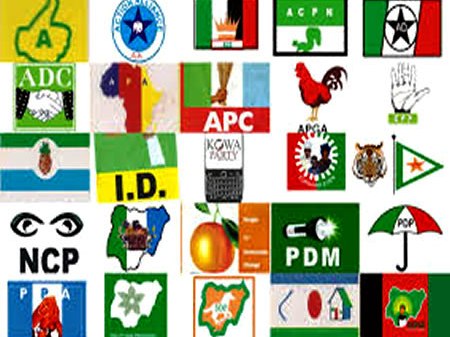
The race to determine who succeeds President Muhammadu Buhari will soon rev up with the campaigns for the 2023 general elections due to commence early September. And by Saturday, 25th February 2023 ceteris paribus, the 96.2 million registered voters shall file out to the 176, 846 polling centres across the country to elect the next occupier of the Presidential Villa, Aso Rock, Federal Capital Territory (FCT), Abuja for the next four years.
Already, a good number of the seventy-eight registered political parties have submitted the lists of candidates for all the elective positions in line with the directive of the Independent National Electoral Commission (INEC), who gave July 17th as the deadline for the submission or substitution of candidates by the parties.
Therefore, beginning from this coming September, till the final conclusions of the next general elections in 25th February 2023 neither the manifesto of the parties nor personalities of the candidates will dominate political discussions, but the ever bordering issue of good governance.
The major task before the these 96 million registered voters, many people focusmagazineonline.com spoken to said ‘ is to ensure that candidate that will deliver good governance get elected”. Nigeria, as a country “is in a dire time, and this need a well-focused leader now”, they argued further.
Octogenarian Nobel laureate, Professor Wole Soyinka puts it more succinctly, Tuesday (2nd August) while moderating a lecture, themed: ‘Good Governance or Misgovernance: The Contract called Democracy’, in Abeokuta, Ogun State. He said clearly that the country is yearning for who would deliver good governance.

Nigeria, from independence, have never been in want of good governance, as she is presently. The inauguration of the present democratic dispensation in May 29, 1999, raised much hope and aspirations of the people, but twenty-three years down the line, the nation is still wandering in slopes, potholes and gallops; still crawling to survive. The nation’s path to greatness remained as blurred as it was back in 1999, while the battle for survival has sapped the country’s almost dry of all resources.
Few weeks ago, the Economist Intelligence Unit (EIU) a global business intelligence, published its reports for the second quarter of the year. The report said Lagos, the nation’s commercial capital city is the world’s second least liveable urban area. EIU ranked Lagos 171 out of 172 countries in the list of most liveable cities in the world for the first quarter of 2022, according to the latest 2022 Global Liveability Index.
This report rates the Nigeria’s best city, the worst in Africa as Damascus (Syria) and Tripoli (Libya) continued to anguish at the bottom of the list along with Lagos (Nigeria) as they face social unrest, terrorism, kidnapping, and religion conflict. This verdict speaks volumes of the socio-economic pains the country is passing through presently. The rating typifies how the international agencies paint the country, twenty-three years after the returns of democracy.
Lagos, the acclaimed mega city, tells the story of the South Western region of the country. The most developed region is said to be largely unliveable. The vast expanse of the Northern hemisphere is unliveable. Same with East and South South regions. Insecurity, poverty, religion distrust, mass unemployment, infrastructural deficit, dysfunctional educational system and social dislocation are all visible in the country, and all are indices of dysfunctional governance.
With the conclusion of the parties’ primary elections and shutdown of submission of candidates by the Independent National Electoral Commission (INEC), the electorates now have a clear view of the colour and identity of each candidates vying for the nation’s number one job, the Presidency.
focusmagazinesoline.com findings revealed that the hangover and brickbats that followed the parties internal primaries may not abate before these parties will go to the general polls, therefore, the next step is the rigmarole of manifesto presentations and campaigns.
As at last count, about 20 parties beat the INEC’s deadline for the submission of candidate’s name for the presidential election. They are:
Adewale Adebayo of the Social Democratic Party (SDP). Adebayo, is a lawyer and founder of the KAFTAN Television. He emerged as
the presidential flag bearer of the SDP at the party’s National Convention that was held in Abuja.
A former Vice president, Atiku Abubakar. Atiku clinched the presidential ticket of the Peoples Democratic Party (PDP), having scored the highest vote in the party’s primary election held on May 28 at the Moshood Abiola National Stadium in Abuja. Atiku served as the Vice President of Nigeria from 1999 to 2007 during the presidency of Olusegun Obasanjo. He had unsuccessfully contested the Office of the President five times, in 1993, 2007, 2011, 2015 and 2019.

Contesting on the platform of the All Progressive Congress (APC) is the former governor of Lagos State, Bola Ahmed Tinubu. Tinubu emerged the flag bearer of APC for the 2023 election in the Special Convention held on Wednesday, June 8, 2022, in Abuja. He defeated the Vice President, Prof. Yemi Osinbajo, former Governor of Rivers State, Rotimi Ameachi, the Senate President, Ahmed Lawan amongst others to pick the ticket.
Tinubu was a two-time governor of Lagos State and the former National Leader of the party. He also served as a senator during the aborted third Republic.
Accord Party (AP) is presenting Professor Christopher Imumolen. Imumolen clinched the presidential ticket of the Party for the general election in 2023 at a Special Convention held in Abuja.
Imumolen is the founder of Joint Professional Training and Support International Limited and UNIC Foundation, a non-profit, non-governmental organization.
Founder and Chief Executive Officer of Roots TV Nigeria, Dumebi Kachikwu, emerged as the presidential candidate of the African Democratic Congress (ADC) at the party’s presidential primary election, which was held in Abeokuta on June 9. He had surprisingly defeated the party’s candidate for the 2019 general election, Kingsley Moghalu to secure the ticket.
The Chief Security Officer to late Sani Abacha, Hamza Al-Mustapha (rtd), emerged as the presidential candidate of the Action Alliance for the 2023 general elections. Al-Mustapha is a former Nigerian Army major and intelligence officer who served as Chief Security Officer to the late Military Head of State, General Sani Abacha. Abacha was Nigeria’s military head of state from November 1993 until his sudden death on June 8, 1998
Also in the race is Mr. Kola Abiola, the eldest son of late Moshood Abiola. Kola emerged as the Peoples Redemption Party (PRP) candidate following his adoption at the party’s primary election.
A son of the Ohinoyi of Ebiraland in Kogi State, Malik Ado-Ibrahim, emerged as the presidential candidate of the Young Progressive Party (YPP). Malik is a businessman and founder of the Reset Nigeria Initiative and One team Arrows A20.
Okwudili Nwa-Anyajike emerged the National Rescue Mission presidential (NRM) candidate in the party’s primary election held in Abuja.
Activist and online publisher, Omoyele Sowore had to stepped down from his position as the national chairman of the African Action Congress to become the party’s presidential flagbearer.
Sowore is a Nigerian human rights activist, pro-democracy campaigner, and founder of an online news agency. Sowore had also, previously run in the 2019 election
A former governor of Kano State, Rabiu Musa Kwankwaso, was confirmed as the New Nigeria Peoples Party (NNPP) presidential candidate for the 2023 general elections. Kwankwaso, a former Kano state governor and the sole presidential aspirant, emerged as the candidate of NNPP at the party’s special convention held in Abuja on Wednesday, June 8.
Former Anambra State governor Peter Obi emerged as the flagbearer of the Labour Party for the 2023 presidential election at the national convention and presidential primary held in Asaba, Delta State capital, on May 30, after Pat Utomi stepped down. Obi joined the LP shortly after he resigned his Peoples Democratic Party (PDP) membership and withdrew from the party’s presidential primary. He was the running mate of former vice president Atiku in the 2019 general election.
Peter Umeadi, a former chief judge of Anambra state emerged as the presidential candidate in the All Progressives Grand Alliance (APGA) primary election, which was held on Wednesday, June 9.
Sunday Adenuga( BP) a businessman from Ogun State, South-West Nigeria, Sunday Adenuga clinched the presidential ticket of the Boot Party (BP) for the 2023 general election in the party’s primary election on June 7.
Yusuf Mamman Dantalle (APM) is the Allied People’s Movement (APM) elected its national chairman, Yusuf Mamman Dantalle as its presidential candidate for the 2023 general election. Dantalle was the party’s sole presidential candidate and was elected by delegates in the presidential primary held at the party’s secretariat in Abuja on Wednesday 8th June 2022.
Most observers spoken to by focusmagazinesoline.com were of the opinion that the list is unwieldy. Mr. Isiaka Adegboyega, a legal practitioner and public commentator believed the country should have stick with and developed the two party system.
He enumerated the advantages of the two party system to include the fizzling away of primordial sentiments of ethnicity and religion. “Jettisoning the idea is bad, but here we are. We should make do with what we have”.
He pointed out that four of the candidates would make serious impact. He mentioned Senator Bola Ahmed Tinubu of APC, Alhaji Atiku Abubakar of PDP, Mr. Peter Obi of LP and Dr. Kwankanso of the NNPP. But he believed that at the end of the day, any of these candidates that promised “delivery of good governance may carry the day”.
Hon. Tunde Badmus, a former legislator shared the same opinion with Mr. Adegboyega. He believed “it is time for our people to insist on the delivery of good governance and not the usual tokenism always handed over to them”.
These candidates that will appear on the ballot paper are not lacking in quality or education, nor in poor manifesto or campaign promises delivery, but getting down to deliver on good governance has always been an inexplicable problem with all the previous administrations.
When former President Olusegun Obasanjo took over in May 29, 1999, the expectations of the citizenry was sky high. This was justifiable for a country that had been under the Jackboots of the Military junta since 1984, save for the brief diachical experiment between1992 and 1993.
The arrangement that was started with the installation of the elected local government chairman and councillors under zero party elction in 1990 collapsed at the last hurdle of electing the president in June, 1993. The Military regime of General Ibrahim Babangida had inexplicably annulled the election in the middle of announcements of results by late Professor Humphrey Nwosu, the then Chairman of the National Electoral Commission (NEC). Late Business mogul and publisher, M. K. O. Abiola of the Social Democratic Party (SDP) was clearly coasting home to an unprecedented victory ahead of his rival, Mr. Bashir Tofa of the National Republican Convenient (NRC).
Generally in the country today, there is widespread poverty, mass unemployment, religion distrust, dysfunctional educational system, and several infrastructural deficits. All these are coming at a time when the nation’s earnings are fast dwindling, or at worst, at its lowest ebb. Earnings from Crude oil have thinned down from the prime 86% figure of the early 2000s. Since the outbreak of the Coronavirus pandemic, prices of the commodity have been precariously fluctuating, at times hitting zero mark at the peak of the pandemic.
To further compound the nation’s financial woes is the issue of debt burden. The country’s total debt stock rose to N41. 6 trillion in the first quarter of 2022, representing a N2. 05 trillion increase compared to N39. 56 trillion recorded as of December 2021.
The buffer account that the government always rely on in dire times, the Excess Crude Account (ECA) is down presently. The Federal Government said the balance in the ECA dropped from $35.37 million to $376,655 in June 2023, without providing further details.
ECA holds the difference between the market price of crude oil and the budgeted price of the product in Nigeria’s budget. It was established in 2004 by the President Olusegun Obasanjo led-Federal Government to save for the rainy days, stabilise the country’s economy and smooth out the impact of price volatility in oil exports. Since its creation, the ECA has been the subject of controversies and allegations of heists and corruption. The account is jointly owned by the FG and all the States of the Federation.
None of the three frontline candidates, Senator Bola Ahmed Tinubu, APC, Alhaji Atiku Abubakar, PDP, and Mr. Peter Obi of (LP) have unveiled his manifesto officially. But already, PDP’s candidate, Atiku had been basing his campaign on the need to restructure the country, revamp the economy and firmed up the security around the country.
Essentially, these have been the main theme of most candidates since the returns to democracy in 1999. The Alliance for Democracy (AD) in 1999, the Action Congress (AC) in 2007, and the All Progressive Congress (APC) in 2014.

A group loyal to Tinubu of APC did pushed out a document titled, ‘My Vision for Nigeria’. In the document, Tinubu promised , “a nation transformed into greatness, the pride of Africa, a role model for all black people worldwide, and respected among all other countries.
Mr. Bayo Onanuga, director, Media and Communication of The Tinubu Campaign (TCO) said the 7-point agenda listed in the document would drive the Tinubu’s Presidency.
But a sour point in the present electioneering is the preponderance of religion factor in all debate, scheme, plan and appointment. Never in the annals of electioneering in the country have religion be made a focal issue as some are attempting to do now. In the rundown to the 1979’s general elections, late Chief Obafemi Awolowo contesting under the platform of the defunct Unity Party of Nigeria, (UPN), picked a fellow christian and southerner, Mr. Phillips Umeadi as his running mate. Not much fuss was made of the issue with the ticket, same when the late Publisher of National Concord, Chief M. K. O. Abola who contested under the defunct Social Democratic Party (SDP), in 1993 who also picked a fellow Muslim, Ambassador Baba GANA Kingibe, thought from the core Northern state of Borno. But all hell have been let loose with the choice of Senator Bola Ahmed Tinubu of a fellow Muslim from Bornu State. Kashim Shettima is a core northerner, a former governor and Senator, but the hues and cries against his nomination cut across party lines.
Two APC’s stalwarts, Mr. Boss Mustapha, former Secretary of the Federal Government (SGF) and Home. Yakubu Dogora, former Deputy Speaker,. Federal House of Representatives were most vehement in their objections to the choice of Shettima. They based their opposition mainly on the religion faith of the candidate and his running mate. Senator Abba Dabo representing Adamawa North has also joined the anti-same faith ticket campaign.
The Christian Association of Nigeria (CAN) has almost broken into pieces over the issue of same faith ticket. While a section is vehemently opposed to the Muslim-Muslim ticket of the APC’s candidate, a section do not bother. All they want is who can resucitate the dying country and revamp her ailing economy.
Wole Soyinka was pizzed off by the rancourous debate over same faith ticket. He sees it “as a reflection of how the country has been fractured along religious lines and its citizens made to look different from one another right from childhood”.
The Nobel laureate described the issue as a mere phobia, stressing “ because when we hear expressions like Muslim/Muslim ticket, Christian/Christian ticket, Orisa/Orisa worshipper ticket. This is where it all begins. This is where the nervousness begins. This is where the anxiety and the phobia begin”.
The Senator Tinubu camp is however, seemed unfazed by the opposition to the ticket. Bayo Onanuga, disclosed to focusmagazinesoline.com that he was amazed that responsible leaders such as Lawal, Dalung and Dogara can stoop so low to spew hateful words as they allegedly did.
He said, “We know where these people are coming from. I won’t like to join issues with anybody. Dogara is a Christian. If you follow him, you will find contradictions in what he said. Who made Dogara the Speaker of the National Assembly? Jubril, a Muslim did. He was his campaign manager. Was it not a Muslim that also made Babachir Lawal the SGF?
“So when you see responsible leaders spew hatred around, you will know that it is not worth joining issues with them. Nigerians have seen through people like this. They are only inciting themselves because they lost out, not the masses. For now, we are looking forward to September when election campaign will kick off”
Onanuga, however, reassured that his principal is reaching out to religious bodies and leaders to assure them that he has no ulterior motive when he settled for a Muslim running mate.
These Bishops, Pastors are strange to us, CAN fumes
“The candidate is talking to the Christian leaders that our ticket is not by religion at all. We believe many of them will see reason and support our ticket. We don’t want to be seen debating Christianity or Islam, that belongs elsewhere. The Tinubu-Shettima ticket is a political one, not what Babachir and Dogara are portraying. We also know it is only a matter of time before they decamp,” he said.
The Lawal and Dogara’s group has been criss-crossing the country in search of alliances and coalition amongst different groups and individuals sympathetic to grouse with the same faith ticket of the APC. The team has met mobilized a group tagged the “APC Northern Christian leaders”. The meeting in a released a communique said it will set up a committee to consult Christian and Muslim stakeholders on a different political party, other than the APC, to support in the 2023 presidential election.The communique was jointly signed by Doknan Sheni (Plateau) North Central; Ishaya Bauka (Taraba) North East and Saidu Ibrahim (Jigawa) North West.
The leaders said the committee was to arrive at the best platform that would better galvanise and steer their patriotic spirits and resolve towards collectively building a united multi religious, multi-ethnic society as guaranteed by Nigeria constitution.
The leaders said that after careful considerations and deliberations, the summit resolved that the adoption of a Muslim–Muslim ticket by their party was divisive, unjust and insensitive.
It, however, stated that the Northern Christians in APC would not support or enable any attempt to divide Nigeria along religions lines.
“We resolved that we will set up a committee within us with a mandate to go round Nigeria and consult with both Christians and Muslim stakeholders, including other stakeholders.”
Working on this, the duo of Lawal and Dogara met with the governor of Benue State, George Ortom, his Rivers State’s counterpart, Mr. Nyesom Wike among others.
Investigations by focusmagazinesoline.com revealed that perhaps, Lawal and Dogara might and perhaps a few others might be the one toeing the religion line. Many people spoken to across party divides were of the opinions that good governance should be priorized over religion or tribal affiliations in deciding who paddle the ship of the nation after President Buhari.
Those spoken to believed that the economy is in shambles, security has collapsed, while the educational sector is almost comatose. An aggressive and dynamic President, they chorused is need post-Buhari.
INEC said the body is ready to conduct a free and fair election anytime, citing the recent Ekiti and Osun States governorship elections as examples. The electoral umpire has also released the full details of the registered voters state-by-state and region-by-region. The North West has the highest registered voters of 22.67 million, followed by South West with 18.3 million. The South South region followed with 15.2 million, North Central followed with 14.1 million, while North East recorded 12.8 million and the had South East with 11.49 million. The total registered voters is 96.2 million.
It is this 96.2 million voters that Nigerians home and in diaspora will rely on to either vote to enthrone good governance, or a confirmation of further descent into the nadir of hopelessness.
Those harping on the need for good governance however, have a backing of a survey conducted by the Africa Polling Institute (API), recently.
Dr. Olugbenga Ogunmefun, Director of Research of the Institute had disclosed at an interactive session with Arise News where he spoke about the result of a survey conducted by the API to gauge the mood of the nation ahead of the upcoming 2023 presidential election
According to him, despite the mixed reactions that have trailed the APC’s Muslim-Muslim ticket, 67 percent of respondents of the survey said they don’t consider religion as a factor in deciding who should lead Nigeria come 2023.
In a video shared on YouTube by Arise News, Dr. Ogunmefun revealed: “In the survey we conducted, we asked Nigerians about the three most important things that they expect from the next president of Nigeria and three key variables came out.
The first one is the capacity and competence to revive the economy. The second one is commitment to tackling insecurity. The third one is the commitment to promoting good governance and cohesion
“67 percent of Nigerians said they are not interested in what religion the next president practices, they want somebody that is going to do the job irrespective of the religion of the person. We have the issue of the Muslim-Muslim ticket but we found out that they are not interested in religion. They are interested in the capacity of the person that is going to be the president. They say they will support a person that can bring positive change in the country and they are not bothered about whether he is a Christian, Muslim, or Traditionalist”
focusmagazinesoline.com (C 2022)
You may like
-
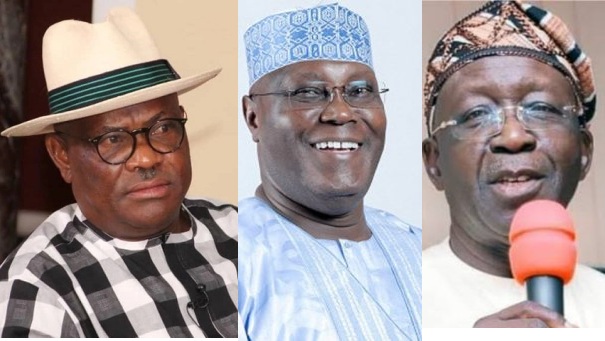

The Wike’s Phenomenon Puts PDP on The Edge
-
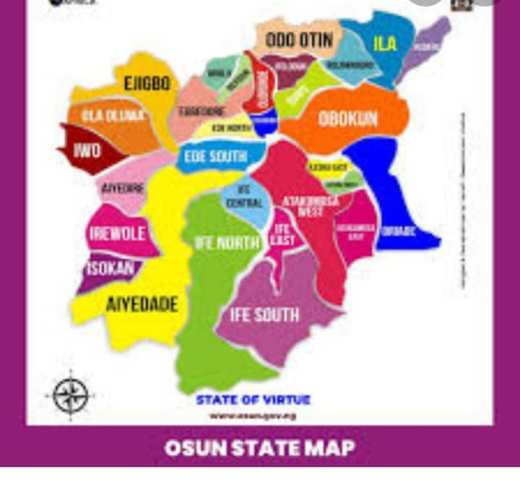

Aftermath Guber Election: Allegations of attacks, killings rent the air
-
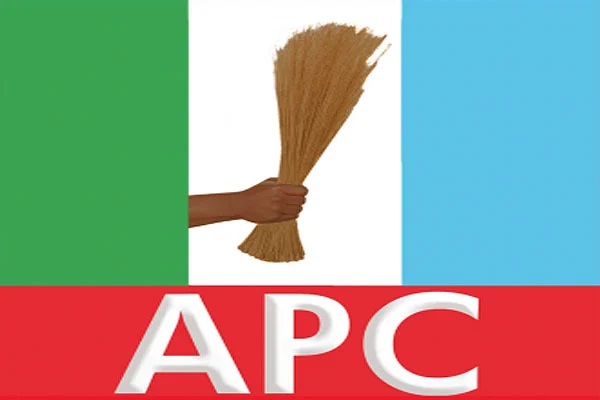

APC Chief decries killing of party men in Ede
-


2023 Presidency: Ekiti opposition unites for Tinubu
-
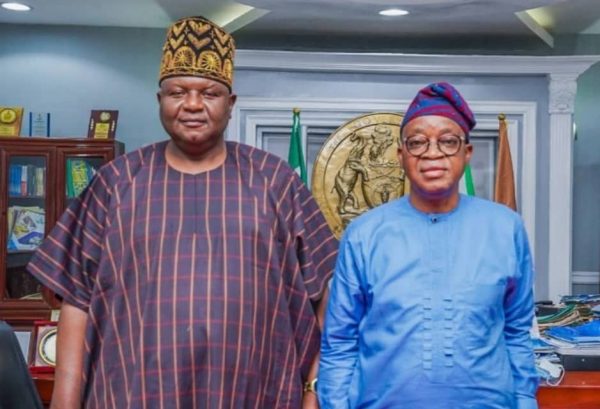

Osun 2022: APC, Oyetola shift battle to Courtroom
-
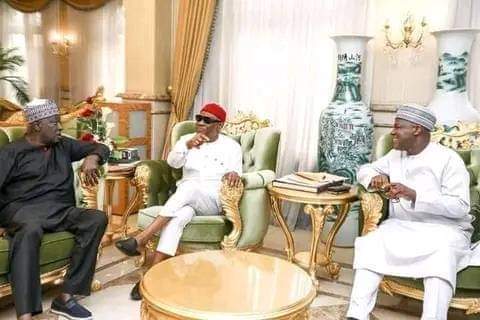

2023 Presidency: Lawal, Dogara seek coalition
Featured
NRC Set for World Class Services Delivery
Published
3 weeks agoon
February 1, 2025By
FocusMag
… Opeifa vows as he assumes office.
The Nigerian Railway system is set for a revolutionary upgrade. The rail infrastructure that has been getting full attention in recent years in the country is set to be taken to a world-class level. And the man aiming to drive the new impetus is the newly appointed Managing Director of the Nigerian Railway Corporation (NRC), Dr. Kayode Opeifa. The man widely known for his midas touch in the transportation sector has set a high bar of standard for himself while at the helm of the fledging corporation.
Dr. Opeifa, assured Nigerians that the railway services delivery would witness a new lease of life.
He vowed to hit the ground running immediately he was inaugurated. He pledged to boldly reposition the corporation for Nigeria’s socio-economic development and offers proactive leadership.
Dr. Opeifa, who spoke during the formal handover ceremony held at the NRC headquarters in Ebute Metta, Lagos, Opeifa outlined his administration’s plans and major priorities, emphasizing modernization, security, service efficiencyand delivery.
At the inauguration event were state dignitaries led by the former Lagos State Deputy Governor and Senior Special Adviser to the President on Sustainable Development Goals, Mrs. Adejoke Orelope-Adefulire; Lagos State Special Adviser on Transportation, Sola Giwa; All Progressive Congress (APC)’s Chieftain in Lagos State, Prince Fuoad Okiand a retired Assistant Inspector General of Police, (AIGP), Hakeem Odumosu.
Dr. Opeifa, a former Lagos State Commissioner for Transportation, declared boldly that “we will be audacious in repositioning NRC for the country’s prosperity.”
He noted that his administration’s mission would centre on efficiency, safety, and customer satisfaction, aligning with President Bola Ahmed Tinubu’s Renewed Hope Agenda and the nation’s 25-year Strategic Rail Modernization Plan.
He promised Nigerians that his administration would modernize the railway infrastructure, expand its services, and introduce new technologies to improve service delivery, efficiency and safety,”
The new railway boss further assured that the main focus of the corporation would now be on connecting major cities, ports, and economic hubs to promote growth.”
While not overlooking the perennial challenges the corporation usually faced, he listed several areas he intend to set his priorities on.
These includes
Security: Collaborating with national security agencies to safeguard NRC infrastructure and customers.
Modernization and Expansion: Upgrading existing rail networks and introducing new technologies.
Service Excellence: Enhancing customer experience, ensuring efficient, reliable, and sustainable services.
Private Sector Collaboration: Creating an enabling environment for private sector participation to boost revenue and economic impact.
He also emphasized the need for transparency, accountability, and inclusivity in decision-making.
Dr. Opeifa expressed gratitude to President Tinubu for his appointment, and vowed to deliver on his mandate.
He acknowledged the contributions of his predecessor in office, Mr. FidetOkhiria, who was absent due to health reasons, and thanked the NRC team for their dedication.
Dr. Opeifa turned to his fellow Nigerians and assured them. “To the people of Nigeria, I promise to be a responsible steward of the resources entrusted to me”
The symbolic handover was conducted by Okhiria’s representative.
Former Lagos Sate Deputy Governor, Mrs. Orelope-Adefulire, in her address, expressed confidence in Opeifa’s capability to reposition the NRC for greatness, urging him to see the appointment as a challenge to contribute to national development.
After the ceremony, the train moved to Agege axis of Lagos State, Opeifa’s constituency where a thanksgiving and reception was held for the new NRC boss.
www.focusmagazineonline.com © January 2005
Featured
Osun Politics: Aregbesola Grappling in The Dark Alley…
Published
3 months agoon
November 30, 2024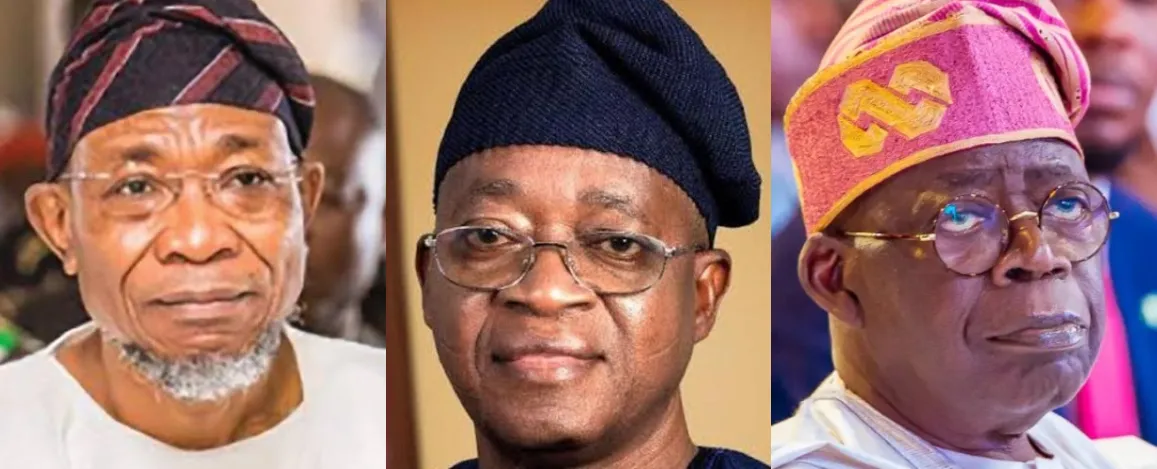
Battles Odds For Survival
Ogbeni Rauf Adesoji Aregbesola, an iconoclastic political strategist, a former Executive Governor of Osun State and also a former Minister of the Interior Affairs has bluntly refused to comment on the political turbulence he is facing both in his State, Osun, and Lagos, where he had a very strong hold on the political structure in Alimosho local government and more particularly, his well-publicized rift with President Asiwaju Bola Ahmed Tinubu.
But one of his right-hand man, who preferred anonymity in a matter of fact, declared that the “door to any reconciliation is closed, finally”.
The associate can actually feel undone by his party’s treatments of Ogbeni Aregbesola and his supporters. They were first expelled by the Osun State chapter in August 2023 by the State Executive Committee of the party.
The State Executive Committee had risen from its meeting and announced the suspension of another set of senior members believed to be supporters and followers of the one-time governor of the State and Internal Affairs Minister, Rauf Aregbesola. Prominent figures on the new list includes the former Secretary to the State Government, Mr. Moshood Adeoti, a former Speaker, Osun State House of Assembly, Hon. Nojeem Salami, a former member of the House of Representatives, who was the Senatorial candidate of the party in Osun East Senatorial District, in the last general election, Hon. Francis Famurewa, and a former Special Adviser to governor Aregbesola, Mr. Kunle Ige, and twenty-two other senior members of the party across the State.
But in a swift reaction then, Mr. Kunle Ige, had dismissed the suspension saying “it is irrelevant and stupid. They can’t even follow common due process. They are destroying the party.
I haven’t been home (Esa Oke) in ages. Since the last election, so where was the anti-party activity? I wasn’t even home (Esa Oke) for the last election. They don’t even think”, he queried.
According to Kunle Ige, the best thing is to “ignore them completely. I don’t have the time for their nonsense”
However, the gale of suspensions were alleged to be a direct response to the launching of the Omoluabi Caucus by the former governor, Aregbesola, in his country home in Ilesa.
While the suspension or expulsion of August 2023 seemed to have died down, another one suddenly erupted in October, 2024. This time around, Ogbeni Aregbesola himself was suspended from the party. And more, he was to face a disciplinary committee for his alleged infractions.
However, this is not the best of time for the political maverick, Ogbeni Aregbesola. His political trajectory from his time at the robustly influential Works Ministry in Lagos State, two-time Executive Governor of Osun State, and lastly, Interior Ministry overseer, attest much to his status as a charismatic grassroots political mobilizer; a man passionately loved by his people, but with an eccentric bend.
While he held sway in Lagos, he built a fortress around himself in the Alimosho local government, the celebrated largest local government area in the country. He controlled the political pulse of the area. And also, was the Alpha and Omega in the larger political empire of Asiwaju Bola Ahmed Tinubu. He simply filled the role of a “Mr. Fix It”. He was both de facto and de jure alta ego of Asiwaju Bola Ahmed Tinubu.
But presently, the man widely acknowledged as “Mr. Fix It” among the progressives clan is in a political quandary; he is simply at a political cross-road. His weird eccentricity has impacted much on his decisions and actions.
Now Ogbeni Aregbesola himself is in a fix politically. He is said to be nursing either a senatorial ambition from the Osun East (Ife/Ijesa) Senatorial district or if the new party in the offing comes alive, a vice presidential slot with Mallam Nasir El Rufai. But while he gropes for just anything to hang on to for safety in the dark alleys the bitter divorce with Asiwaju Bola Tinubu and the Bourdillion’s political family, has thrown him into, his supporters were still incorrigibly optimistic about his chances of clinging either of the two positions.
But the political road is dark, the coast is very bleak. He is very familiar with all the intrigues and cut throat shenanigans in political circle. He was the Lord in Tinubu’s political empire at a point. He knew the door to his familiar terrain in the All Progressives Congress (APC) might have been permanently shut against him. After all, he witnessed the door being shut against some of his erstwhile colleagues while serving as the Commissioner for Works and Infrastructure in Lagos State.
A member of the Governing Advisory Council (GAC) in Lagos State, who spoke to our correspondent, asked rhetorically recently in an interview with www.focusmagazineonline.com that “of the more than twenty Commissioners, who served under Tinubu with Aregbesola, how many can confidently raise their hands up and still stand by him?
He continued, “the downfall of these men were largely the scheming and shenanigans traceable to Ogbeni Aregbesola. Even the former Governor Akinwunmi Ambode would not forgive him in an hurry”, he said.
Now, the Apha Ogbeni Rauf, is in a quandary himself. He cannot break the barrier erected against him in Tinubu’s empire or APC. He finds it extremely difficult to co-habit with the uninspiring Adeleke Ademola in the Peoples Democratic Party (PDP), the Labour Party is an amnesia to him, yet he has the ambition of going to the Senate or running as a Vice President. Hence the option of a new political party. The new party according to proponents will be national in outlook and is expected to push both the ruling APC and PDP into the limits.
www.focusmagazineonline.com can recalled that Ogbeni Aregbesola, at a point was effectively, the de facto Asiwaju Ahmed Bola Tinubu’s alter ego. in the group, he decided what happened and who got what, in short, he called the shots. And in the words of an All Progressives Congress (APC) leader in Lagos State, the common refrain then in Bourdillion, Tinubu’s residence and political headquarters, was: “go and see Rauf”.
According to the member of the GAC, who preferred anonymity, whatever happened, or who got what or became what, be it in the Governing Advisory Council (GAC), the apex committee overseeing the affairs of Lagos State Government by proxy, were decided mainly by Ogbeni Aregbesola. He was said to have promoted, demoted, terminated, even truncated many political ambitions while his grips on Bourdillion lasted. His imprimatur were said to be everywhere. But not anymore.
Perhaps, his present travails allegedly started from his closeness, roles and actions as Tinubu’s alter ego. As the associate believed that “many around Asiwaju weren’t comfortable with Rauf being so close to Asiwaju… and thus sponsor and even encouraged the division”.
The first signal was the dissolution of the Mandate Group in Lagos. The Group was formed by the core loyalists of Bola Tinubu, the then Executive Governor of Lagos State. Ogbeni Aregbesola was largely in control. By 2017, he had installed his protégé, Alhaji Abdullahi Ayinde Enilolobo as the Apex leader. Suddenly the group, alongside others like Justice Forum and BATCO were dissolved by fiat by the party’s leadership.
However, Ogbeni Aregbesola’s followers in Osun traced his disagreements with the leadership of the Tinubu’s political hegemony to the succession politics in Osun State when his tenure as a two time Executive Governor was rounding up in 2017. Sources in Oshogbo, Osun State, Aregbesola was said to have insisted in having Alhaji Moshood Adeoti, from Iwo Local Government of Osun West Senatorial District as his successor. Thus he plainly explained to Tinubu. But Tinubu was alleged to have preferred his cousin, Mr. Adegboyega Oyetola from Iragbiji, in Boripe Local Government Area, Osun West Senatorial zone of Osun State. From this point, the loggerhead between the two political gladiators was said to have taken its roots. Asiwaju was said to started distrusting Ogbeni and started “feeling that he was becoming a threat to his ambition”.
Aregbesola was said to have grudgingly accepted to work for Gboyega Oyetola at the polls during the 2018 out of circle governorship election in Osun State. Oyetola had emerged victorious after a most rancorous election ever that ended with re-run in four words of Ile Ife, Orolu, and Oshogbo returned him with a margin of less than 500 votes.
In the said election, Aregbesola’s anointed candidate, Moshood Adeoti with hordes of his supporters had mass-moved into another political platform, the Action Democrats Party (ADP). Alhaji Moshood Adeoti cornered the over fifty thousand votes from the Iwo axis, but performed poorly in all other local governments. He came a distant fourth behind Oyetola, Adeleke, and Omisore.
Aregbesola, the master political strategist, took good notice of these returns from the elections. He waited patiently, observing the various take home from the off-cycle election, while looking for the right time to strike. He needed to exact his revenge and teach his former leader some political lessons.
The former eccentric governor started his vengeance war with the ministerial nomination for the State. He was said to have stunted both the nominations of Asiwaju Bola Tinubu and another elder of the party, Chief Bisi Akande, to emerge the Interior Affairs Minister during the second term of former President Muhammadu Buhari’s tenure. He was alleged to have used another eccentric political strategist up North, Mallam Nasir El Rufai to clinch the slot. With his emergence as a Minister, he was said to have clearly drawn the battle line with his political block. And from there, he brooks no odds. He started creating his platform, well outside the Bola Tinubu’s or APC’s blocks.
First step was the launching of the True Osun Progressives group (TOP), then the Omoloabi Forum within the State APC. These groups were essentially made up of notable foot soldiers of APC in Osun State, but who were fiercely loyal to Ogbeni Aregbesola. The twin group quickly spread across all the thirty-three local governments in the State. The State Government under Mr. Oyetola was said to have been seriously rattled by the emergence and spread of TOP in the State. The party also panicked. Known members of Aregbesola’s government were the leaders.
While the newly formed TOP and Omoluabi groups could not wrestle the governorship ticket from Oyetola during party’s primary leading to the 2022 off-cycle governorship election in the State, they quickly drew back and withdrawn from the party’s activities. When they re-emerged, it was with the opposition candidate, Mr. Ademola Adeleke.
The experience of the 2018 election that pitied Aregbesola’s candidate, Alhaji Moshood Adeoti of ADP with Iyiola Omisore of SDP, Jackson Adeleke of PDP and Oyetola of APC together has taught the maverick political strategist a lesson. Obviously, Adeoti cannot pull through if fielded again. Then his next move was shocking. Aregbesola and his troops decided to deployed their political weight behind Ademola Adeleke of the Peoples Democratic Party (PDP). He won.
Not many people were fooled when known acolytes of the former Minister started mobilizing for Adeleke. APC made faint attempt to mend fences. But it was rather too little or too late or both. Efforts by notable personalities, including the renown cleric, Papa Enoch Adejare Adeboye, an Ifewara Ijesaland born General Overseer of the Redeemed Christian Church of God, (RCCG), the Ooni of Ile Ife, Oba Adeyeye Enitan Ogunwusi, and others ended with naught.
Responses to all these attempts to thaw the raging rift were not encouraging. It was apparent by the body languages of the main actors that the two main combatants are done with each other. Asiwaju Bola Ahmed Tinubu seemed apparently, tired of Rauf Adesoji Aregbesola and vice-versa. Nothing seemed pulling the mutual confidence again. Aregbesola became bitter, enraged. And he let loose his anger, albeit, without restrain.
On the day of the election, the Minister was out of the country but apparently was keenly watching and monitoring events from home. But very early the second day, while the results started pouring in and Adeleke of PDP was edging Oyetola clearly in all the local governments, someone in his team haphazardly released a tweet that not few consider irrational. Although the tweet was quickly pulled down and disclaimed, certainly not a few had saved, or screenshot it. The “Osun Le Tente” tweet (Osun on top) will remain in the remembrance of many leaders for a long time to come.
Also, in the lead up to the APC’s presidential primaries, where thirteen aspirants slugged it out with Tinubu for the Presidential ticket, although Aregbesola was not in the fray, yet his hands were prominently seen and felt throughout the campaign.
While the campaign was gathering steam, Aregbesola was in Ijebu Jesa. He needed to meet his TOP members. A woman loyalist who claimed she attended the well-attended meeting recalled to www.focusmagazineonline.com the hard words he deployed while describing Bola Tinubu.
This many damaging rumours that later emanated from the Ijebu Jesa’s meeting apparently hurt Bola Tinubu and his supporters to no end. It was at the period when a picture of him was trending. He had visited a former Military President in his residence in Minna and the paramount ruler of Ijebuland, Awujale of Ijebu Ode, Oba Sikiru Adetona, when for whatever reasons, a patch of wetness was observed on his lower backside when standing up. This was translated by detractors to mean uncontrollable blader, an illness often associated with old age or panicking.
However, Ahmed Tinubu would eventually emerged the winner of the election and inaugurated the sixteenth President of the Federal Republic of Nigeria. And ever since Aregbesola has been in the political wilderness, operating on a thin thread, occasionally test running various strategies to reestablish himself.
He has been seen variously hobnobbing with the government of Ademola Adeleke, the Osun State Governor, and also, had appeared in open drive along major streets both in Oshogbo and Ilesa. But these political stunts were not enough to fetch him any huge dividends.
But while all seemed stable a bit, the Osun State chapter of the APC slammed him with a suspension, over allegations of anti-party activities. The suspension, which takes immediate effect, is pending the outcome of disciplinary proceedings initiated by the state’s party leadership.
The decision to suspend the former Governor followed a request from the Ilesa East Local Government APC Executive Committee, which petitioned the state party chairman, Tajudeen Lawal, to take action against Aregbesola, citing his alleged involvement in actions that undermined the APC as a party.
The committee, in a letter, accused Ogbeni Aregbesola of promoting factionalism and colluding with opposition parties, among other allegations.
Responding to the request, the Osun State APC Executive Committee notified the party’s national leadership, represented by APC National Chairman, Dr. Abdullahi Ganduje, of its decision to suspend Aregbesola and to establish a disciplinary panel to investigate the charges.
The resolution, dated October 22, titled “Resolution Suspending Rauf Aregbesola for Anti-Party Activities and Constituting a Disciplinary Committee,” was signed by Osun APC Chairman Lawal and Secretary Kamar Olabisi. The document outlined the allegations and Aregbesola’s suspension based on Article 21 of the APC Constitution.
“Following complaints of anti-party activities levelled against Ogbeni Rauf Aregbesola by the Ilesa East Local Government Executive Committee, the State Executive Committee (SEC), after reviewing the allegations and in accordance with the powers vested in it by Article 21(3)(vi)(c) of the party’s Constitution, hereby suspends Ogbeni Rauf Aregbesola from the party pending the outcome of an investigation,” the statement partly read.
The charges against Aregbesola include, factionalizing the APC by forming the Omoluabi Caucus splinter group; allegedly collaborating with opposition parties to destabilize the APC in Osun State; publicly criticizing party leaders, including President Bola Tinubu, Chief Bisi Akande, and former Osun Governor, Gboyega Oyetola; refusing to participate in or support APC activities within the state; and refusing to vote for the party since the 2019 general elections.
The committee will deliver its findings and recommendations to the state executive within 14 days. It also issued a formal notice to Aregbesola, inviting him to appear and defend himself against the allegations.
In a follow-up letter dated October 24 and signed by Osun APC Disciplinary Committee Secretary, Waheed Adediran, the former governor was given 48 hours to respond to the allegations in writing.
Sources at the party’s secretariat in Oshogbo revealed to www.focusmagazineonline.com that the former Minister had simply spurned all the letters sent to him.
When www.focusmagazineonline.com contacted him on his WhatsApp contact, for an interview, he simply reply “Thanks. No, please”
Many of his men who were suspended by the Osun chapter of APC however, denied receiving any letter of suspension from the party.
His men in Alimosho, Lagos State were also not willing to talk to the press. Alhaji Abdullahi Ayinde Enilolobo, his man Friday, refused to talk nor comments when contacted. He did not reply to all our messages to him.
But his troops in Osun State are boiling, not relenting in stating his case. Mr. Kunle Ige too was suspended by the party since August of 2023. But he told www.focusmagazineonline.com then that he was not aware of his suspension as he was not officially served any letter suspending him from the party.
However, many of the associates of the former Governor in Oshogbo were particularly irked by the recent developments. One of them, a former senior official of Ogbeni Aregbesola’s government revealed to www.focusmagazineonline.com that he was part of all the reconciliatory efforts to douse the tension between the two combatants, President Bola Tinubu and Ogbeni Aregbesola. But he noted sadly that “it appeared he (President Tinubu) is no longer interested in having Aregbesola around him”
Blunt and bold to a fault, Kunle Ige refused to comment on the suspension of Aregbesola. “No comment on the suspension… that’s their business…”, he blurted out when contacted by www.focusmagazineonline.com.
On the plans by some of Aregbesola’s supporter to announce their new political home this December, a former aide declared that “Ogbeni has not categorically given anybody any date…. But obviously he has his plans for the future politically especially for Osun…. The talk of December is because there is a third party option being planned … which might come on stream then… and it is a national one”.
The aide declared the rumoured adoption of Labour Party (LP) as “rubbish… LP was never was on the cards..”.
When asked pointedly why was it difficult for Aregbesola and Tinubu to settle their rift, considering the fact that Aregbesola was the de facto leader of Tinubu’s political block before the fall out, he insisted that “you should ask Asiwaju that question…”
Another associate who spoke to www.focusmagazineonline.com explained further that it “took Ogbeni a while to realise that they had been waging a war against him since 2017..”
He denied that the feud had its roots in the Moshood Adeoti versus Gboyega Oyetola’s struggle for the succession of Ogbeni Aregbesola. He said “well… certain things are now coming to light that shows that they had wanted to cut him (Ogbeni Aregbesola) to size since then (2017). They just wanted him to finish his term and step aside”.
With a despairing note, he declared that “I think that door (to any reconciliation) is finally closed”.
According to him, “Asiwaju is not interested in any reconciliation, since if he ever was, this wouldn’t have been an issue”.
He revealed that he had “been deeply involved in the past in trying to resolve the rift, but clearly Asiwaju isn’t interested”.
In Osun State, not many supporters of Ogbeni Aregbesola is discreet, about his next political moves. A former local government chairman told www.focusmagazineonline.com angrily that “God willingly by December, our Symbol, Rauf Aregbesola, will unveil the new party we are moving to”.
He also declared that “the people in APC, especially Tinubu, doesn’t need him in the party again, likewise the Oyetola’s camp in Osun. So we leave their party for them”.
www.focusmagazineonline.com ©December 2024
Featured
4 youths Perish in River Osun after Granny’s funerals
Published
3 months agoon
November 12, 2024By
FocusMag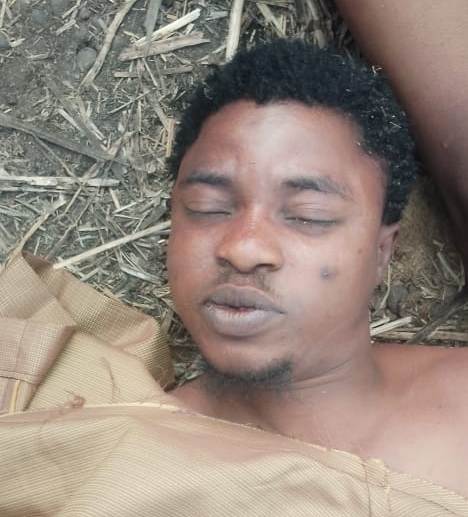
The tranquillity and calmness of the sleepy, but rustic community of Oke Imesi, Ekiti West Local Government, Ekiti State, were ruptured early Sunday morning when four young boys were mysteriously drowned in the River Osun, along the Oke Imesi, Ido Ile and Ikoro road.
The four young boys, aged between 24 and 27, were said to be in the town to attend the final funeral rites of the grandmother of two of them.
When www.focusmagazineonline.com correspondent visited the town, people were seen in groups discussing the ugly incident in hushed tones.
Generally, silence and unease calm pervaded the atmosphere, even up to the Palace of the traditional ruler, Owa Ooye.

Eye witnesses disclosed to www.focusmagazineonline.com that two of the boys, Mr. Gabare and an unidentified friend, had followed their friends, Mr. Samson Anisere and his cousin, Mr. Leye Adeoti, to celebrate the final funeral rites for late Mrs. Anisere, who hailed from Obanla Compound, Oke Imesi.
Our correspondent learnt that the boys decided to go and swim in the river around 11:45 am, since they had decided not to embark on the journey back to Lagos on Sunday. The funerals were done on Saturday, November 9.
All through Monday, the traditional institution of the town were busy with offering of sacrifices and performing all necessary rituals to appease the god of river and to prevent a reoccurring of such ugly incident.
According to tradition, the corpses must be bury by the bank 0f the river and must be done without delay.
Meanwhile, the remains of the four boys were buried by the river’s bank on Monday evening, after consultation with all the families of the bereaved and necessary police report obtained by the community.
www.focusmagazineonline.com ©November, 2024
Trending
-
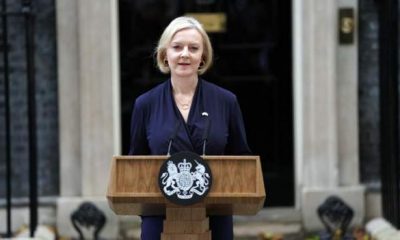
 Main Story2 years ago
Main Story2 years agoBREAKING: Liz Truss resigns as UK prime minister
-

 News3 years ago
News3 years agoSports: Messi misses out on Ballon d’or, Oshoala, Adeyemi in female, junior lists.
-

 Featured3 years ago
Featured3 years agoPolitics of Forced Congratulatory Messages Over Osun Guber Election
-

 Business2 years ago
Business2 years agoCurrency Redesign: Emefiele Unperturbed As Nigerians Groan in Pains
-
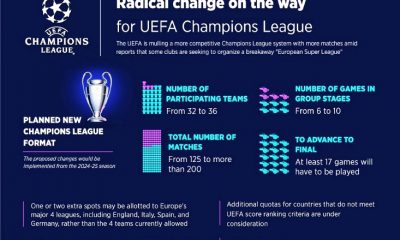
 Sports1 year ago
Sports1 year agoUCL format to change for 24/25 season: groups, knockout, league table
-
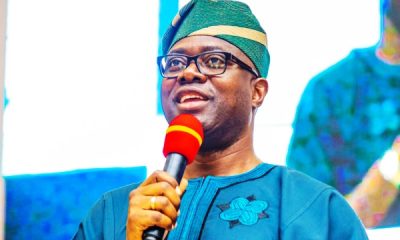
 Main Story1 year ago
Main Story1 year agoReal Reasons Makinde Refuses To Announce New Alaafin
-
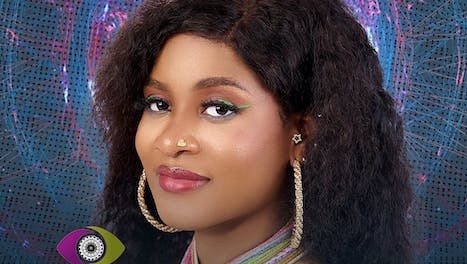
 News2 years ago
News2 years agoBREAKING: Phyna is BBNaija season 7 winners
-

 Economy2 years ago
Economy2 years agoCBN’s Change of Naira Shocks Nigerians, EFCC Hail Moves Clampdown on Currency Hoarders
